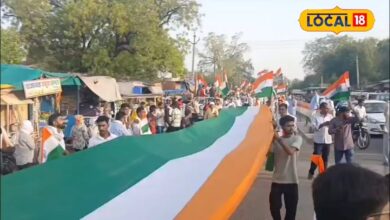Rajasthan
Seed Treatment: Go For Seed Treatment Before Rabi Harvest: Govt To Farmers | Jaipur News

Jaipur: With Rabi crop harvest approaching, the agriculture department has asked the farmers to go for seed treatment before sowing mustard and gram crops.
The department has urged farmers to take crop protection measures after germination.
The agricultural ecosystem contains a wide variety of creatures that are capable of harming plants. They weaken plants, cause them to develop more slowly, and typically lower yields.By shielding seeds from soil-borne infections, seed-borne insects, illnesses, and pests, chemical or biological seed treatments can offer vital protection from the start of the crop cycle, protecting the emergence of the seeds from the soil and during the initial stage of the crop cycle.
In addition, crop protection is crucial to agriculture because it preserves the earth’s biodiversity and nutrient levels while making the best use of labour, land and water resources. This raises food quality and lowers its price.
“Farmers are advised to do seed treatment of mustard and gram before sowing. Usually, 4-5 kg mustard seeds are taken per hectare for sowing. It has been advised to treat the seeds with 2.5 gms of Mancozeb (agricultural fungicide) per kg and then sow the seeds. After this, the mustard seeds should be treated with Rhizobium (soil bacteria) and PSB (organic biofertilizer),” an official noted.
Last year, the Rabi crop sown area was 20.88 lakh hectares and this year, it is 26.13 lakh hectares, the agriculture department stated.
This year, the Centre has approved hike in the Minimum Support Price (Rabi Crops MSP) for the marketing year 2024-25.
The MSP of wheat, the biggest crop of Rabi season, has been increased by 7%. There was a similar increase in the MSP of lentils. The MSP of oilseed crops has been increased by 2.5 to 4%. The MSP of gram, the main pulse crop of Rabi season, has been increased by 2%.
We also published the following articles recently
The department has urged farmers to take crop protection measures after germination.
The agricultural ecosystem contains a wide variety of creatures that are capable of harming plants. They weaken plants, cause them to develop more slowly, and typically lower yields.By shielding seeds from soil-borne infections, seed-borne insects, illnesses, and pests, chemical or biological seed treatments can offer vital protection from the start of the crop cycle, protecting the emergence of the seeds from the soil and during the initial stage of the crop cycle.
In addition, crop protection is crucial to agriculture because it preserves the earth’s biodiversity and nutrient levels while making the best use of labour, land and water resources. This raises food quality and lowers its price.
“Farmers are advised to do seed treatment of mustard and gram before sowing. Usually, 4-5 kg mustard seeds are taken per hectare for sowing. It has been advised to treat the seeds with 2.5 gms of Mancozeb (agricultural fungicide) per kg and then sow the seeds. After this, the mustard seeds should be treated with Rhizobium (soil bacteria) and PSB (organic biofertilizer),” an official noted.
Last year, the Rabi crop sown area was 20.88 lakh hectares and this year, it is 26.13 lakh hectares, the agriculture department stated.
This year, the Centre has approved hike in the Minimum Support Price (Rabi Crops MSP) for the marketing year 2024-25.
The MSP of wheat, the biggest crop of Rabi season, has been increased by 7%. There was a similar increase in the MSP of lentils. The MSP of oilseed crops has been increased by 2.5 to 4%. The MSP of gram, the main pulse crop of Rabi season, has been increased by 2%.
We also published the following articles recently
Crops not sown in 10L hectares this kharif
The delayed southwest monsoon and erratic rainfall have severely impacted kharif sowing in Andhra Pradesh. The targeted acreage of 35 lakh hectares has only seen cropping in about 25 lakh hectares, resulting in a reduction of 10 lakh hectares. Cash crops like groundnut, cotton, sugarcane, and sunflower have been the most affected. This reduced acreage is expected to affect the overall production of grains, pulses, and oilseeds, while the patchy rainfall may negatively impact yields during harvesting. Farmers are concerned about poor productivity and potential losses.
The delayed southwest monsoon and erratic rainfall have severely impacted kharif sowing in Andhra Pradesh. The targeted acreage of 35 lakh hectares has only seen cropping in about 25 lakh hectares, resulting in a reduction of 10 lakh hectares. Cash crops like groundnut, cotton, sugarcane, and sunflower have been the most affected. This reduced acreage is expected to affect the overall production of grains, pulses, and oilseeds, while the patchy rainfall may negatively impact yields during harvesting. Farmers are concerned about poor productivity and potential losses.
Rs 22,000 crore subsidy bill for rabi crop gets nod
The Union cabinet has approved a subsidy of Rs 22,303 crore for phosphatic and potassic (P&K) fertilisers for the current Rabi season starting in October. This subsidy is 57% lower than the previous Rabi season and 31% less than the Kharif season. The government aims to prevent any extra burden on farmers due to rising international prices. The subsidy figure may change depending on international prices, and so far, 54% of the budgeted subsidy for the current financial year has been utilized.
The Union cabinet has approved a subsidy of Rs 22,303 crore for phosphatic and potassic (P&K) fertilisers for the current Rabi season starting in October. This subsidy is 57% lower than the previous Rabi season and 31% less than the Kharif season. The government aims to prevent any extra burden on farmers due to rising international prices. The subsidy figure may change depending on international prices, and so far, 54% of the budgeted subsidy for the current financial year has been utilized.
Farmers switching from tobacco to other crops
A recent study conducted by the Centre for Multi-Disciplinary Development Research (CMDR) found that many farmers in the Belagavi district of Karnataka, India, have voluntarily stopped growing tobacco and switched to other crops. The study also revealed that the area of land used for tobacco cultivation has decreased from 24,000 hectares to 6,000-7,000 hectares. The farmers in Belagavi are now growing crops such as sugarcane, maize, soybean, cotton, and engaging in floriculture. The CMDR plans to hold workshops in other states to encourage tobacco growers to adopt alternative crops.
A recent study conducted by the Centre for Multi-Disciplinary Development Research (CMDR) found that many farmers in the Belagavi district of Karnataka, India, have voluntarily stopped growing tobacco and switched to other crops. The study also revealed that the area of land used for tobacco cultivation has decreased from 24,000 hectares to 6,000-7,000 hectares. The farmers in Belagavi are now growing crops such as sugarcane, maize, soybean, cotton, and engaging in floriculture. The CMDR plans to hold workshops in other states to encourage tobacco growers to adopt alternative crops.





